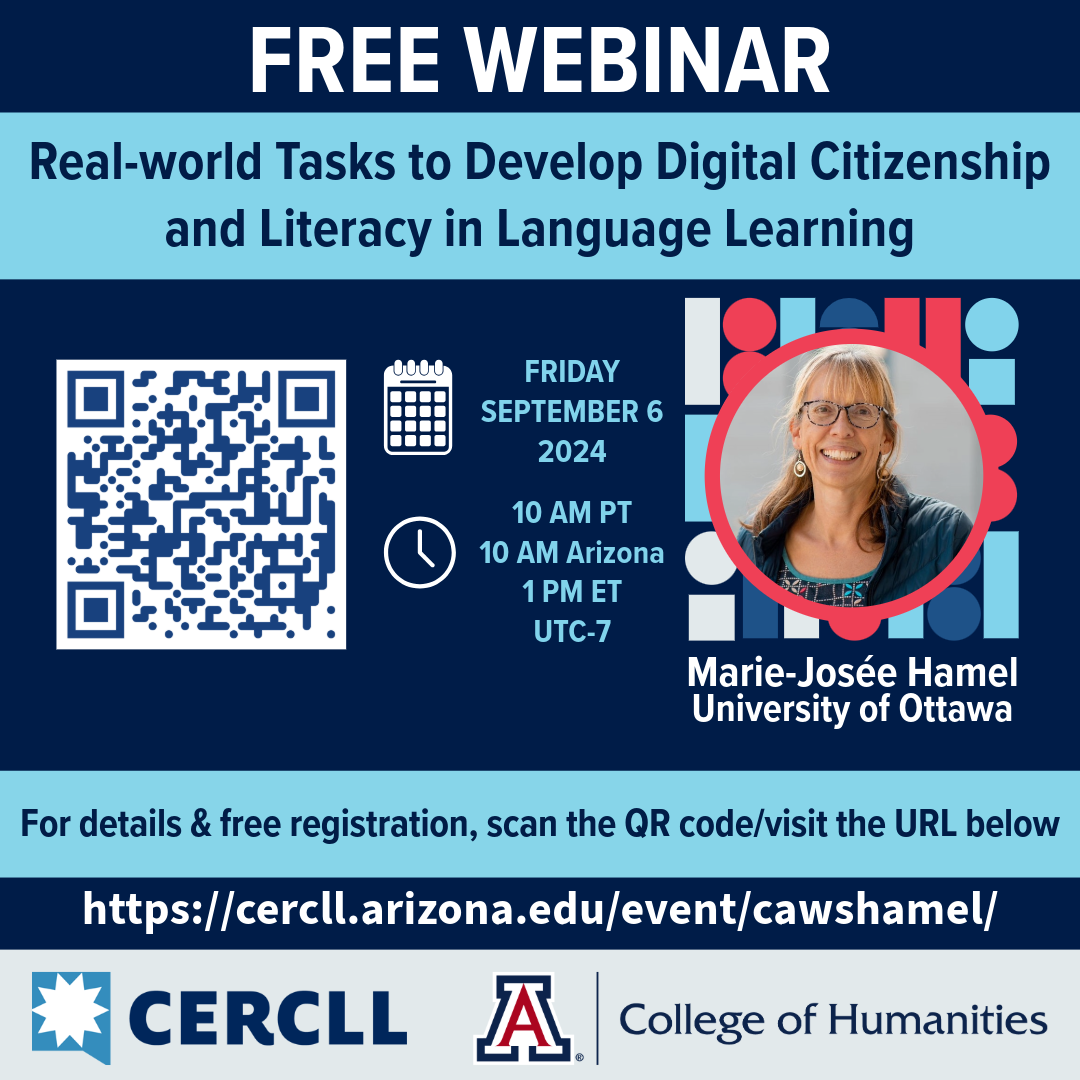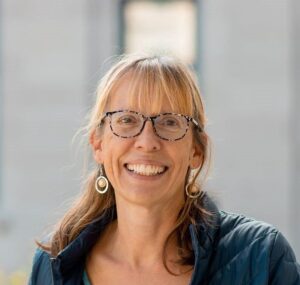Webinar presented by Marie-Josée Hamel (University of Ottawa)
Access Dr. Hamel’s slides here [PDF]
E-lang citizen pedagogical approach (English) [PDF]
Friday, September 6, 2024,10-11:30 AM Arizona (UTC-7)
This is the final webinar in our Summer series, Digital Multimodal Composition in Language Education.

Abstract:
Engagement in real-world tasks provides language learners with opportunities to immerse themselves in authentic online communication, exercise active citizenship, and apply their digital literacy skills practically. This approach facilitates the development of the necessary knowledge, skills, and attitudes for effective digital citizenship and appropriate language usage within genuine contexts.
In this webinar, Dr. Hamel will introduce a pedagogical framework (Ollivier et al., 2021) that promotes active, participatory, transformative, and reflective learning through tasks conducted on open digital platforms. Recognizing the significance of social and interpersonal dynamics in the learning process, it emphasizes the critical role of interpersonal interactions in facilitating meaningful learning experiences. This framework originates from an ECML project called eLANG Citizen project (www.ecml.at/elangcitizen). In a view to develop sustainable competencies as well as promote a safe, ethical and interactive engagement on Web 2.0 sites, the eLANG Citizen project has been working on developing theoretical and practical resources that language instructors can use to focus on digital literacies and digital citizenship in the language classroom. The main objective of the project is to “help learners become digital citizens and develop the capacity to use digital media critically, creatively and autonomously in several languages”.
A major part of the webinar will be dedicated to defining the concept of real-world tasks (RWT) and to the demonstration of various RWT from the online resources developed by the eLANG Citizen team. Participants will be invited to try them out and then imagine how they could integrate some of these RWT into their own context of teaching.
Finally, this webinar will give an opportunity to participants to think creatively and critically about the concept of digital citizenship in the context of language education and specifically how it can be operationalized through RWT putting at the forefront authentic social interactions.
Bio:
 Dr. Marie-Josée Hamel has been actively involved in Computer Assisted Language Learning (CALL) teaching, research and development since 1994. She worked at the Centre for Computational Linguistics at the University of Manchester Institute of Science and Technology for ten years, as co-investigator of an EU funded NLP-based CALL project called FreeText. She then took a position as Associate Professor of Applied Linguistics in the French Department of Dalhousie University and joined the Official Languages and Bilingualism Institute (OLBI) at the University of Ottawa in 2009. Dr. Hamel has an interest in language technologies; CALL ergonomics; blended learning (face-to-face and online) in the context of language teaching and learning; the development of digital literacy for the teaching and learning of languages. She currently collaborates as a Canadian expert on a project from the European Centre for Modern Languages called eLANG.
Dr. Marie-Josée Hamel has been actively involved in Computer Assisted Language Learning (CALL) teaching, research and development since 1994. She worked at the Centre for Computational Linguistics at the University of Manchester Institute of Science and Technology for ten years, as co-investigator of an EU funded NLP-based CALL project called FreeText. She then took a position as Associate Professor of Applied Linguistics in the French Department of Dalhousie University and joined the Official Languages and Bilingualism Institute (OLBI) at the University of Ottawa in 2009. Dr. Hamel has an interest in language technologies; CALL ergonomics; blended learning (face-to-face and online) in the context of language teaching and learning; the development of digital literacy for the teaching and learning of languages. She currently collaborates as a Canadian expert on a project from the European Centre for Modern Languages called eLANG.
Dr. Catherine Caws (University of Victoria) was originally scheduled to co-present this webinar, but unfortunately had to withdraw.
Registration for this event is closed.
Participants attending live can request a certificate of attendance for 1.5 hours of Continuing Education during the event. They can request a digital badge after the webinar, once they are contacted by CERCLL after the event.
Participants who require closed captions or an ASL interpreter during CERCLL’s events should make this request at least a week in advance by emailing CERCLL at cercll@email.arizona.edu.

